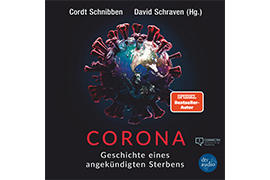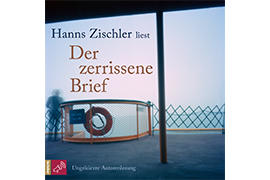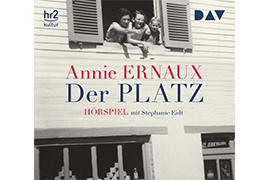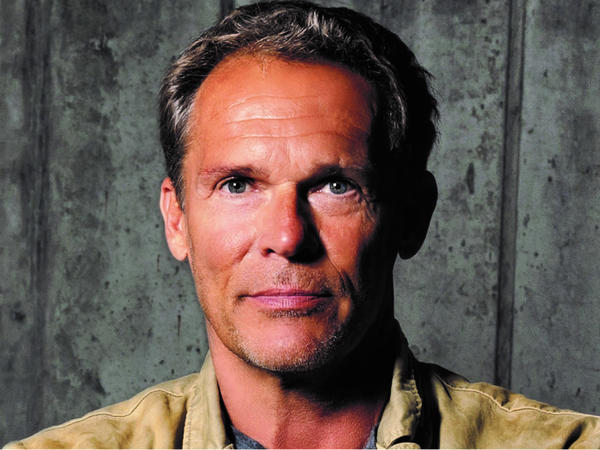
Audio
From bestsellers and new publications to audiobook originals – great listening experiences await.
Focus on: Audio
Exciting listening
Brutal murders, feverish searches for evidence – powerful voices draw fans of crime stores right into the action, catapulting images and bolts of fear right into their minds and limbs. Whether you are into psychological thrillers, detective stories, true crime, or unsolved cases, or find quirky local detectives entertaining, 2020's audiobooks offer something for everyone.
A series of murders has shaken Helsingborg. The perpetrator’s approach is brutal and apparently random. When Inspector Fabian Risk finally gets behind the perfidious game, his life ends up depending on lucky coincidence. Penetratingly read by David Nathan, the voiceover artist for Johnny Depp, it is hard to drag yourself away from Stefan Ahnhem’s “Return of the Dice Murderer”.

Stefan Ahnhem: Rückkehr des Würfelmörders
(English: Return of the Dice Murderer)
Translated into German by Katrin Frey. Read by David Nathan.
Hörbuch Hamburg, 2 MP3 CDs, 18.00 €
Strong nerves and a lot of concentration are needed for listeners following the latest case of Will Trent and his romantic partner, the forensic specialist Sara Linton. In Atlanta, a young jogger is attacked with a hammer and left to die in the forest. An inmate of the state prison maintains that the case is identical to the murder of a woman that he was unjustly convicted of eight years earlier. Actress Nina Petri so engagingly and vividly portrays “The Silenced Woman” by best-selling author Karin Slaughter, it takes your breath away and the 1,246 minutes of audio time simply fly by.

Karin Slaughter: Die verstummte Frau
(English: The Silenced Woman)
Translated into German by Fred Kinzel. Read by Nina Petri.
Harper Audio, 3 MP3 CDs, 19.99 €
In “Cold Case – the Missing Girl”, a mysterious series of murders on women leads to an old missing-person case for which Tess Hjalmarsson, expert for unsolved cases, is called in. This cold-case debut from the prize-winning Swedish crime reporter Tina Frennstedt follows a realistic and highly convincing storyline, while actress Tessa Mittelstaedt brings every protagonist to life in a performance worthy of the big screen.

Tina Frennstedt: Cold Case – Das verschwundene Mädchen
(English: Cold Case – the Missing Girl)
Translated into German by Fred Kinzel. Read by Tessa Mittelstaedt.
Lübbe Audio, 6 CDs, 16.00 €
Walter Roth, with years of experience as a press officer for the Freiburg Police Department, shows what real investigative work looks like in “Special Commission Erle” based on the murder of a 27-year-old female jogger in a small town bordering on the Black Forest. Using classic police language and the professional style of a press spokesman, Erich Wittenberg explains how forensic work, combined with meticulous application of the latest investigative technologies, leads to the arrest of a serial murderer of women.

Walter Roth: SOKO Erle. Der Mordfall Carolin G.
(English: Special Commission Erle. The Murder of Carolin G.)
Read by Erich Wittenberg. Audiobuch Verlag, 1 MP3 CD, 17.95 €
After all that gruelling true-crime police work, it is time to get away on a holiday. If the coronavirus has forced you to spend your at home, you can accompany Inspector Dupin to Saint-Malo for a police seminar in “Breton Delicacies” by Jean-Luc Bannalec, and enjoy the fascinating landscape and culture of the Emerald Coast. A sibling murder, dark family secrets, and the breathless voice of narrator Gerd Wameling leave very little chance to digest the last course before the action moves on.

Jean-Luc Bannalec: Bretonische Spezialitäten
(English: Breton Delicacies)
Read by Gerd Wameling. Argon Verlag, 2 MP3 CDs, 19.95 €
Tourists in Greece accompanying Kostas Charitos are also given little chance to rest. The country is in the midst of the financial crisis, and adding to the people's burning rage, a series of bloody murders on bankers has rocked Athens, already sweltering in the summer heat. “Bad Loans” by Petros Markaris is now available as an audiobook and looks back – narrated unabridged by Daniel Buser – at the 2010 banking crisis from the Greek point of view.

Petros Markaris: Faule Kredite
(English: Bad Loans)
Read by Daniel Buser. Diogenes Hörbuch, only as MP3 download, 14.95 €
In contrast, there is a lot of room for laughter in the regional murder mystery featuring Bavaria's own Miss Marple, Daisy Dollinger, as she investigates the murder of a musician in Munich's Hofbräuhaus. “The Half-Russian” by Isolde Peter, read at a brisk pace by Shandra Schadt with humour and charm, awakens our interest in further acoustic investigations.

Isolde Peter: Der halbe Russ
(English: The Half-Russian)
Read by Shandra Schadt. Argon Verlag, only as MP3-Download, 20.95 €
Text: Anita Strecker
Talk with: Anja Herrenbrück
In the beginning was the Word
The theatre play “God” by Ferdinand von Schirach is now available in audio form. Director Anja Herrenbrück talks about the challenges and her fascination with the production.

Anja Herrenbrück, director of the audio play "Gott" by Ferdinand von Schirach
© Andreas Rehmann
Frau Herrenbrück, audio dramas usually evoke the notion of an opulent background tapestry of sounds, creating new worlds. Ferdinand von Schirach's drama “God” presents only one setting: the hearing room of an ethics council that is ruling on the fully healthy 78-year-old Richard Gärtner’s right to assisted suicide. What sort of challenge was it to create audio scenery with an almost complete absence of background sounds, while still maintaining dramatic tension?
Anja Herrenbrück: Schirach's play “God” is a chamber drama. For example, in the way that the actors on the stage must settle a conflict among themselves without any change of location. Often, the only “weapon” available to them is language. This sort of chamber play is incredibly easy to adapt to an audio format, in my opinion. In any case, I really enjoyed it: even in an audio play, the dialogue can be powerful and captivating. That comes from the way the listeners can ignore certain stimuli, especially visual ones, and focus even more closely on what is being said.
Boiling it down to the essentials...
We made a conscious decision to reduce the background sounds to a minimum and not to render them realistically. Normally, in a room like that there would always be someone coughing or shifting their chair, and naturally we could have added that to the ongoing background atmosphere. But that was irrelevant. What was relevant were the various arguments and positions that the fictional players were presenting and discussing.
Still, listeners always have a clear sense of where they are.
I let the atmosphere of the ethics council hall “shine through” now and then (e.g. in Biegler's interjections). That is enough to maintain awareness of the location of the action and who is present. I approached the music in much the same way. The brief islands of noise and music are nonetheless quite important, because such a dense text requires some breathing space here and there. Just like you get the chance to stretch your legs between movements of a classical symphony – and hopefully, not yawn.
Eight renowned actors including Florian Lukas, Jördis Triebel, and Corinna Kirchhoff were involved. What was important in the casting?
With a text like “God”, I needed to know in advance if someone would really be able to get their heads around the topic. I was convinced that these were the right people. They did not let me down. Quite the opposite. Most of all, I am thankful to Peter Rühring for returning to the studio. He played the role of Richard Gärtner. The interpretation that he lent to Peter Rühring was a true gift.
Theatre lives from interaction – how does one go about picturing the setting in your production?
Fortunately, we recorded most of the text before the coronavirus pandemic. So I was able to record a large share as an ensemble. All of the expert testimonies on the topic of assisted suicide, with Frau Keller (Jördis Triebel) and Herr Biegler (Florian Lukas), was recorded as dialogue.
What was it about your work that you found the most appealing and inspiring?
As I said, chamber drama is a challenge that I gladly take up. I also have a lot of fun with audio plays featuring lush background atmospheres and music. But I’m also happy when I have the chance, as in this case, to concentrate more on directing the spoken word. In addition, I could work a lot more closely with Schirach, and the way he constructs and formulates arguments. That was very interesting.
Interview: Anita Strecker
Ferdinand von Schirach: Gott
(English: God)
Audio play with Florian Lukas, Jördis Triebel, Peter Rühring et al.
Der Hörverlag, 2 CDs, 18.00 €
3 Listener recommendations

Cordt Schnibben, David Schraven (publishers): Corona
Geschichte eines angekündigten Sterbens
(English: Corona: The Story of Dying Announced in Advance)
Read by Gregor Höppner.
dtv audio, 2 CDs, 14.95 €
Cordt Schnibben, David Schraven (publishers): Corona
Geschichte eines angekündigten Sterbens
(English: Corona: The Story of Dying Announced in Advance)
Read by Gregor Höppner.
dtv audio, 2 CDs, 14.95 €
Coronavirus – there’s no avoiding the word in 2020, the year of the pandemic. Cordt Schnibben, a writer at Der Spiegel, collaborated with David Schraven, founder of the research group Correktiv, to compile a real scientific drama based on the research of 18 different journalists – from the COVID-19 outbreak in Wuhan to the crises affecting economic systems and the consequences for people worldwide. They captivatingly describe how politics intervened, from playing down to shutting down, to cooperation with scientists and partisan tactical posturing. Gregor Höppne reads the German audio edition grippingly and pointedly, resulting in a 725-minute flood of information that is easy to follow and allows listeners to form their own opinion of the situation.

Hanns Zischler: Der zerrissene Brief
(English: The Torn Letter)
Read by the author.
tacheles/Roof Music, only as MP3 download, 14.95 €
Hanns Zischler: Der zerrissene Brief
(English: The Torn Letter)
Read by the author.
tacheles/Roof Music, only as MP3 download, 14.95 €
1966. Elsa is visiting her “adoptive mother” Pauline. While rummaging through old letters, photos and papers, lost memories of the 77-year-old return, who left her home village in northern Bavaria at age 17 in 1899 and fled to New York for two years. Her husband-to-be Max gave her 2,000 Gold Marks to do so – by his reckoning – to make her into a travelling companion later in life. Piece by piece, the memories of their love and countless journeys come together to form a momentous life. Hanns Zischler's first novel “Der zerrissene Brief” (The Torn Letter) is brimming with poetry, the emotion of which comes across very well in the German audio version. The author reads the work himself; nobody else could do a better job of finding the right tone.

Annie Ernaux: Der Platz
(English: A Man's Place)
Audio drama. Read by Stephanie Eidt.
Der Audio Verlag, 1 CD, 14.00 €
Annie Ernaux: Der Platz
(English: A Man's Place)
Audio drama. Read by Stephanie Eidt.
Der Audio Verlag, 1 CD, 14.00 €
She wants to write about her dead father, the son of a farmhand who worked his way up to owning a store with an attached inn. The daughter attends university, becomes part of the educated bourgeois, which her father is excluded from. Class distinctions preclude a poetic novel based on recollections. The mixture of love and shame calls for a neutral tone, objectively describing his life. In the audio drama based on the novel “A Man's Place” by Annie Ernaux, the actress Stephanie Eidt delivers a cool first-person tone of voice. Pauses for breath create minimalistic, rhythmic musical interludes. This very reduction is what makes this audio drama into such a penetrating and authentic study.
Texts: Anita Strecker
Audiobook recommendation
From the Virgin Mary to the sexual revolution
Going through puberty in a conservative Bavarian family is not easy. Between fizzy drink powder, arch-conservative Prime Minister Franz Josef Strauss and the sexual revolution, a lot of creativity and inventiveness are needed, as author Peter Probst and audiobook reader Christian Tramitz can tell us first-hand in “Wie ich den Sex erfand” (How I Invented Sex) .
Peter Probst. Picture: Bernhard Haselbeck

Christian Tramitz. Picture: glampool

“Holy Mary, Mother of God, I pray to you, please do not appear to me!” Bavarian Catholicism can lead to sleepless nights, especially when you are not yet twelve, growing up in a devoutly Catholic household on the border between the boroughs of Untermenzig and Obermenzing in Munich filled with unsettling stories of appearances of the Virgin Mary and dark, cryptic secrets that are revealed only to her chosen acolytes through the Immaculate Conception.
The travails of the young Peter Gillitzer only grow more intense with the onset of puberty, since Peter cannot begin to ask his strictly conservative parents to explain anything about the female anatomy or what mysterious words like incest, coitus, petting or pornography might mean. The only sexual education he can get is from pilfered tabloids and clandestine research in his father's encyclopaedia to help him seem less than a total idiot to his classmates, who have already relegated him to the lowest level of the hierarchy.

Peter Probst: Wie ich den Sex erfand
Read by Christian Tramitz. (English: How I Invented Sex) Kunstmann, 2 MP3 CDs, 20.00 €
With dry wit, sometimes absurdly funny, Peter Probst, in “How I Invented Sex”, relates the trials and tribulations of a young pubescent male in the year 1970, whose view of the world does not extend beyond Untermenzig,Catholicism and Franz Josef Strauss, and whose father sees a class party in the Catholic rectory as a clear and present threat of sex orgies, moral decay and incurable venereal diseases – while feeling equally threatened by Premier Willy Brandt's brand of creeping socialist subversion.
From our modern point of view, the novel comes across more as “reports from a strange Southern German tribe”, says the author and prize-winning screenplay writer Peter Probst. In truth, the 57-year-old actually experienced a lot of the scenes first-hand. “The most over-the-top incidents actually happened.”
The sorrows of young Peter G. in their full tragicomic dimension come across all the better in the audiobook edition with speaker Christian Tramitz. As a native Bavarian speaker, the protagonist from various well-known German film comedies and political satirist really finds the right tone, using detailed descriptions, scenes and malapropisms to bring to life the spirit of the seventies and the conservative, arch-Bavarian spirit of the times, as meticulously described by the observer Probst in all its unique absurdity.
As a screenplay writer, Probst is thick-skinned, “ready to give up every text for adoption” and to rely on others' interpretation of his work, he says. In this case, Christian Tramitz was his dream candidate as speaker: “He really got the spirit of it, the audiobook could not have come out better”. And for good reason. The actor, two years older than Probst, lived in the same borough and went to the same school, enjoying the attentions of the same teachers. This makes 57-year-old Probst's coming-of-age novel an incredibly successful overall work as an audiobook: Tragic, bizarre, astoundingly funny, contemplative – a total delight for all generations.
Text: Anita Strecker
Portrait of: Nico Holonics
Bringing the spirit of the text to our ears
For his debut novel “Elbwärts” (Down the Elbe), Thilo Krause, economist, poet, author, and native of Dresden, received the 2020 Robert Walser Award. The actor Nico Holonics brings forth the poetry contained in the work with his powerful voice.

© Franziska Taffelt
“That is my rock. A windy cliff, a couple of gnarled firs. I come here in the evenings to look down at our house from above.” The voice of the actor Nico Holonics draws us dreamily into the story and the world of memories as related to us by the first-person narrator, who has moved back to his old home, together with his wife and daughter. Everything is familiar, the paths through the forest between the sandstone rocks on the Elbe, which our narrator has walked countless times with his friend Vito, to the monoliths that they wanted to be the first to climb.
With the power of his voice, Holonics lures us ever more deeply into the emotional world of the first-person narrator. Through his recollected images, there arises the atmosphere of the forest, its scent, and feeling. The story glides forward, almost like music, foreshadowing the gravity that pulls us in. Everything familiar has grown strange; the narrator is an outsider, no longer a native. He encounters mistrust and open hostility from a group of neo-Nazis. “Down the Elbe” is a real find, says Holonics. “The language is great, but most of all I was impressed by the quiet, melancholic, and conflicted mood of the protagonist.”
Apart from his work as an actor (he is currently a member of the Berlin Ensemble), he sees his work as a narrator as a unique activity with a completely different set of demands. It offers a “holiday from visual input” – all attention is concentrated on the text and voice. The challenge is to capture and transport the spirit of the text, without letting his interpretation destroy the intimacy that arises between the text and a reader silently reading a book.

Thilo Krause: Elbwärts
Read unabridged by Nico Holonics. (English: Down the Elbe) Der Audio Verlag, 6 CDs, 22.00 €
Holonics’ acting career led him not only to TV roles, but also to renowned playhouses in Dresden, Munich, Frankfurt, and now Berlin. Over time, the 36-year-old has consistently expanded his activities as a voice actor. He reads audiobooks, audio plays, and appears regularly on the radio. It’s a double career that started more or less by chance. While auditioning for the director of the Ernst Busch school of acting, he caught the attention of Michaela Ziegler, the very icon for speaking roles for radio and audio plays, and was invited to recording try-outs. “At that time I was heavily mentored, which is how it all got started.”
The affinity for voice acting has been with the 36-year-old since he was young. As a boy, he set up a recording studio in his basement, so he relates. With a bicycle lamp on the door that lit up when he was recording stories and poems on cassette. Later, he was able to add music to his voice with his computer. Music also plays a key role for his powerful voice: at the age of eight, the native of Leipzig became a member of the Gewandhaus Children's Choir, later moving on to the Gewandhaus Choir under the direction of Kurt Masur. So it is no coincidence that Holonics compares his preparation for an audiobook with that for a musical score, repeatedly working through the text with detailed annotations to the dramatic arc, key pauses for breath, or coloured highlights for individual characters so as not to get them mixed up while reading. “It is really just like with music. It starts with the overture, then comes the exposition, a scherzo, and various movements until the grand finale.”
Thilo Krause's novel “Down the Elbe” comes fully loaded. He can even relate to the protagonist on a personal level. Holonics grew up in a village near Leipzig, surrounded by a countryside that he still feels very close to. But he, too, cannot relive his childhood adventures in the forests outside his family home, he feels alienated from the people he grew up with. “The way they talk – even about each other.” Many have come to embrace right-wing nativist populism, and are anything but open-minded. “That creates alienation, rage, helplessness.”
Text: Anita Strecker
Newsletter
Stay up to date about trends, offers and relevant news by subscribing to our newsletter.
